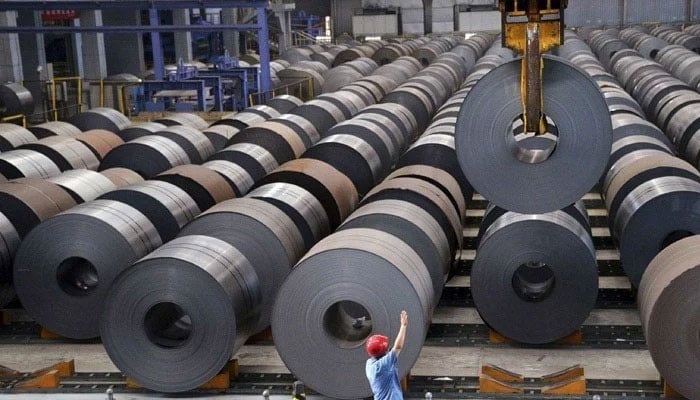Steel industry wants turnover tax cut to 0.5pc
Steel industry emphasises the need for equal treatment across all sectors to foster a conducive business environment for growth and investments
ISLAMABAD: The steel industry is urging the government to ensure equitable taxation by reducing the turnover or minimum tax rate to 0.5% from the existing 1.5% in the forthcoming budget for 2024-25.
The Pakistan Association of Large Steel Producers (PALSP) has appealed to Finance Minister Muhammad Aurangzeb to eliminate discrimination in the levy of turnover or minimum tax on the steel sector, aligning it with other industrial sectors.
PALSP’s communication highlights that while some favoured industries enjoy a reduced turnover tax of 0.5%, others, including the struggling steel sector, face higher rates of up to 1.25%. Despite promises of reduction in the Finance Bill 2023-24, the tax measure was not implemented in the Finance Act.
The steel industry emphasises the need for equal treatment across all sectors to foster a conducive business environment for growth and investments. Amid economic challenges, the industry asserts its crucial role in the country’s economy, contributing significantly to revenue generation and job creation.
The current economic difficulties, including currency devaluation and import dependence on raw materials, have exacerbated the steel industry’s plight. Despite its substantial contributions, the industry faces an uphill task due to high turnover tax rates and financial constraints.
Experts note that reducing turnover tax is feasible and essential for industrial growth, especially considering the sector’s importance in revenue generation and employment.
The steel industry’s plea for a reduced turnover tax rate and an extended adjustment period aims to stabilise operations and prevent closures amidst challenging economic conditions.
-
 Savannah Guthrie Sends Desperate Plea To Mom Nancy Kidnapper
Savannah Guthrie Sends Desperate Plea To Mom Nancy Kidnapper -
 NBA All-Star 2026 Shake-up: Inside The New USA Vs World Tournament Format
NBA All-Star 2026 Shake-up: Inside The New USA Vs World Tournament Format -
 Warner Bros Consider Reopening Deal Talks With Paramount, Says Reports
Warner Bros Consider Reopening Deal Talks With Paramount, Says Reports -
 Andrew Mountbatten Windsor Faces Future With UK MPs, Says Expert
Andrew Mountbatten Windsor Faces Future With UK MPs, Says Expert -
 Shamed Andrew Told 'nobody Is Above The Law' Amid Harrowing Silence
Shamed Andrew Told 'nobody Is Above The Law' Amid Harrowing Silence -
 Gisele Bundchen Melts Hearts With Sweet Bike Ride Glimpse Featuring Son
Gisele Bundchen Melts Hearts With Sweet Bike Ride Glimpse Featuring Son -
 Prince William Found Meghan Markle ‘quite Refreshing’ At Start
Prince William Found Meghan Markle ‘quite Refreshing’ At Start -
 Kate Middleton Knew Should Could Not Be ‘voice Of Reason’ With Prince Harry
Kate Middleton Knew Should Could Not Be ‘voice Of Reason’ With Prince Harry -
 Rihanna Has Wardrobe Malfunction At A$AP Rocky Fashion Show
Rihanna Has Wardrobe Malfunction At A$AP Rocky Fashion Show -
 Prince Harry Felt System Had ‘one Rule For Him, One For Prince William’
Prince Harry Felt System Had ‘one Rule For Him, One For Prince William’ -
 Jake Paul's Fiancée Sends Him Over The Moon Over Stunning Victory
Jake Paul's Fiancée Sends Him Over The Moon Over Stunning Victory -
 Harper Beckham Sends Valentine’s Love Amid Brooklyn Family Drama
Harper Beckham Sends Valentine’s Love Amid Brooklyn Family Drama -
 Why Prince William, Kate Middleton 'partnership' Is Important For Monarchy
Why Prince William, Kate Middleton 'partnership' Is Important For Monarchy -
 Katie Price Drama Escalates As Family Stays In Touch With Ex JJ Slater
Katie Price Drama Escalates As Family Stays In Touch With Ex JJ Slater -
 Critics Target Palace Narrative After Andrew's Controversy Refuses To Die
Critics Target Palace Narrative After Andrew's Controversy Refuses To Die -
 Sarah Ferguson’s Delusions Take A Turn For The Worse: ‘She’s Been Deserted’
Sarah Ferguson’s Delusions Take A Turn For The Worse: ‘She’s Been Deserted’




